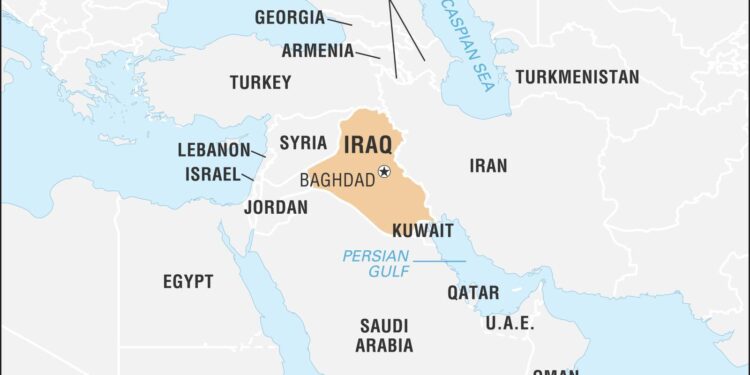As humanitarian crises continue to unfold across the globe, the situation in Iraq’s refugee and displacement camps has reached a critical point following significant cuts to U.S. aid. Once a lifeline for countless families suffering the aftermath of conflict and instability, these resources have dwindled, leaving thousands in desperate need of basic services and support. Reports indicate that with the reduction of funds, essential healthcare, food supplies, and shelter provisions are becoming increasingly scarce. This article explores the dire consequences of the U.S. aid reduction on Iraq’s vulnerable populations, highlighting the escalating struggles within the camps and the urgent need for renewed international attention and assistance. As conditions deteriorate, the question arises: what does the future hold for those who have already endured so much?
Iraq’s Displaced Population Faces Dire Consequences as US Aid Cuts Take Effect
The abrupt reduction of United States aid to Iraq has plunged the already vulnerable displaced population into a deeper crisis, leaving thousands struggling to meet their basic needs. With essential services dwindling, displaced families are finding it increasingly difficult to access food, clean water, and medical assistance. As funding from international donors shrinks, the humanitarian organizations that once provided critical support are now closing their doors or scaling back operations, exacerbating an already dire situation. The repercussions are severe: families living in cramped, overcrowded camps are facing rising tensions and deteriorating mental health amid uncertainty about their futures.
Reports indicate that the camps, once vibrant with the hope of returning home, now echo with desperation and despair. The following key issues have surfaced in the aftermath of the aid cuts:
- Food Insecurity: Many families have reported skipping meals, with malnutrition rates skyrocketing among children.
- Health Care Access: Clinics lack vital supplies, leading to untreated infections and chronic illnesses.
- Psychosocial Strain: Elevated stress levels have contributed to an increase in mental health issues, with a lack of counseling services.
International advocacy groups are urging the U.S. government to reconsider its stance on aid, recognizing that the consequences of inaction extend far beyond borders. The plight of Iraq’s displaced population serves as a stark reminder of the humanitarian responsibility to provide adequate support in times of crisis.
Critical Conditions in Camps Demand Urgent Humanitarian Response and Support
The recent cessation of U.S. aid to Iraq has plunged the already vulnerable camps into a crisis characterized by severe shortages of essential resources. Thousands of displaced individuals, who had sought refuge in these camps, now face dire living conditions as humanitarian organizations scramble to fill the void left by the reduction in support. Reports indicate a significant decline in basic necessities, including food, medical supplies, and clean water, exacerbating the plight of families who have already experienced the trauma of displacement. Without immediate intervention, the humanitarian situation could devolve into a catastrophe affecting thousands of lives.
Among the most pressing challenges now confronting camp residents are:
- Food Insecurity: Many families report diminishing food supplies, with daily rations shrinking as stockpiles dwindle.
- Inadequate Medical Care: Health facilities within the camps are struggling to provide necessary treatments, leading to preventable health issues.
- Water Scarcity: Access to clean drinking water is severely limited, placing residents at risk of waterborne diseases.
- Psychosocial Stress: The compounded stress of uncertainty and lack of resources is taking a toll on mental health, particularly among children.
| Resource Needed | Current Status | Urgent Action Required |
|---|---|---|
| Food Supplies | Low | Immediate distribution of rations |
| Medical Aid | Crisis | Deployment of additional medical teams |
| Clean Water | Scarce | Establishment of water filtration systems |
Long-term Solutions Essential to Address Ongoing Crisis and Vulnerability of IDPs
The ongoing crisis in Iraq’s internally displaced persons (IDPs) camps has reached a critical juncture, exacerbated by significant cuts in US aid. As the number of displaced individuals continues to rise, the reliance on international support has become more pronounced. Without a comprehensive strategy to facilitate self-sufficiency, IDPs face an uncertain future characterized by deteriorating living conditions. Local organizations and governments must collaborate to implement
- Economic Empowerment Programs: Developing job training and micro-financing opportunities.
- Education Initiatives: Ensuring access to quality education for displaced children.
- Healthcare Accessibility: Establishing sustainable medical services within camps.
Implementing these long-term strategies not only addresses immediate needs but also cultivates resilience among affected populations. The focus should shift from temporary aid to fostering an environment where IDPs can thrive independently. Moreover, enhancing local community ties can significantly improve resource sharing and support networks, ultimately leading to a more integrated recovery process. Relevant stakeholders must prioritize these initiatives to mitigate the ongoing vulnerabilities faced by the displaced.
| Strategy | Expected Outcome |
|---|---|
| Economic Empowerment | Increased self-sufficiency and reduced reliance on external aid |
| Education Initiatives | Improved literacy rates and future job prospects |
| Healthcare Initiatives | Better health outcomes and reduced morbidity |
The Way Forward
As Iraq’s camps grapple with the immediate fallout of significant cuts to U.S. aid, the humanitarian crisis within these temporary shelters continues to deepen. With dwindling resources and escalating needs, displaced families are left to confront a harsh reality where survival hangs by a thread. The ramifications of these funding reductions extend beyond basic necessities, threatening to unravel the fragile social fabric that sustains these communities.
As international attention turns to other global crises, the situation in Iraq serves as a stark reminder of the ongoing struggles faced by millions who have been uprooted by conflict. The urgent calls for renewed support from aid organizations and local leaders highlight the necessity for a renewed commitment to humanitarian assistance that prioritizes the welfare of vulnerable populations.
With the impact of these aid cuts still unfolding, it is imperative that the international community steps up to address the dire needs in Iraq’s camps. Only through concerted efforts and sustained support can hope be restored to those who have already endured so much. The coming months will be critical in determining the fate of countless families, as they navigate a path toward recovery amid uncertainty and hardship.














Italy to Deport Egyptian Imam After Controversial Comments at Pro-Palestine Rally